|
|
|
Sort Order |
|
|
|
Items / Page
|
|
|
|
|
|
|
| Srl | Item |
| 1 |
ID:
097677
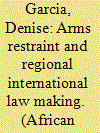

|
|
|
|
|
| Publication |
2009.
|
| Summary/Abstract |
This article analyses the political evolution and legal structure of the Economic
Community of Western African States (ECOWAS) Convention on Small Arms and
Light Weapons, Their Ammunition and Other Related Material, adopted in 2006,
within the broader context of the small arms debate at the regional (initiatives by Mali)
and international levels, principally at the United Nations. The ECOWAS Convention
breaks new ground as it is based on human security, international humanitarian law,
sustainable development and human rights principles. The ECOWAS Convention is
groundbreaking in many respects. It is innovative especially vis-à-vis basing its text on
international humanitarian law, international human rights law and development needs.
In comparison with all other instruments of law on small arms, it is one of the most
evolved.
|
|
|
|
|
|
|
|
|
|
|
|
|
|
|
|
| 2 |
ID:
097680


|
|
|
|
|
| Publication |
2009.
|
| Summary/Abstract |
In this article an overview is provided of the terrorist threat and vulnerabilities in eastern
Africa, where all countries have been victimised by terrorism in one form or another,
and of the capacity of governments to respond.
The article highlights both the lack of sub-regional counterterrorism cooperation and
the emphasis that has so far been placed on the need for military, law enforcement, and
other security-related responses to the threat. It calls for a broader-based, long-term
strategy in eastern Africa not only to thwart and respond to terrorist attacks, but to
prevent the violent radicalisation of local populations which might resort to terrorism
in the future.
The article looks at the response at the sub-regional level and what has developed
into the primary mechanism for fostering deeper sub-regional cooperation, the
Intergovernmental Authority on Development's Capacity Building Programme against
Terrorism, and how these may be improved. It also examines how the United Nations
can help strengthen that cooperation and the opportunity offered by the UN Global
Counter-Terrorism Strategy. It argues that ICPAT, with its technical focus and relative
success to date, offers a solid foundation to improve counterterrorism cooperation in
eastern Africa and between the sub-region and the United Nations, and has a key role to
play in carrying forward implementation of the UN Strategy, serving as an interlocutor
between the sub-region and the international community.
It concludes that counterterrorism efforts in eastern Africa need to be grounded in the
needs and priorities of countries in the sub-region and that more must be done by key
counterterrorism donors, UN agencies, and others not only to enhance the securityrelated
capacities of countries in sub-region but to address the underlying conditions
conducive to the spread of terrorism there as well.
|
|
|
|
|
|
|
|
|
|
|
|
|
|
|
|
| 3 |
ID:
097674


|
|
|
| 4 |
ID:
097672
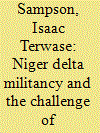

|
|
|
|
|
| Publication |
2009.
|
| Summary/Abstract |
This article examines the dilemma of the Nigerian Legislature in enacting legislation
on terrorism with regard to the Niger Delta militancy. It argues that although Nigeria
requires legislation on terrorism, such efforts should take cognisance of its peculiar
sociopolitical and legal development. It warns that a Western approach to terrorism
legislation may exacerbate violence in the Niger Delta in view of the people's persistent
opposition to anti-terrorism legislation as a government ploy to criminalise their
campaigns for justice. It further contends that in spite of its criminal manifestation, the
Niger Delta crisis stems from genuine grievances about amongst others sustained state
neglect, protracted desecration of the local environment and destruction of sources of
livelihood. The article concludes by offering political and legal strategies for combating
terrorism in Nigeria without exacerbating the Niger Delta situation.
|
|
|
|
|
|
|
|
|
|
|
|
|
|
|
|
| 5 |
ID:
097668
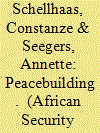

|
|
|
|
|
| Publication |
2009.
|
| Summary/Abstract |
Peacebuilding has been promoted as a new international paradigm guided by
humanitarian values and with the objective of bringing peace and justice to war-torn
countries. Critics say, however, that peacebuilding is a form of imperialism designed to
serve the interests of the powerful in the Bretton Woods system by pacifying and even recolonising
the countries of the South. We assess these perspectives to better understand
the main issues and implications of this unfolding debate. Despite the appearance of
something new, peacebuilding has the same assumptions as modernisation theory,
the Bretton Woods path of development. Most peacebuilding literature, by being nonreflexive,
helps legitimise this dominant ideology.
|
|
|
|
|
|
|
|
|
|
|
|
|
|
|
|
| 6 |
ID:
097673
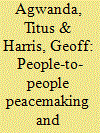

|
|
|
|
|
| Publication |
2009.
|
| Summary/Abstract |
This article examines the peacemaking work of the New Sudan Council of Churches
in southern Sudan, particularly since 1997, which focuses on reaching peace agreements
between conflicting parties. This peacemaking work has had impressive successes but its
effectiveness is under threat from a number of factors following the 2005 comprehensive
peace agreement which have resulted in high levels of intra- and inter-community
violence. In traditional communities, conflict-resolving procedures are often limited
when faced with contemporary conflicts. To protect these peace agreements and to help
build sustainable peace, this article recommends a greater emphasis on peacebuilding, in
both its conflict prevention and recovery aspects. A four-stage model of peacebuilding is
proposed and seven important components of a peacebuilding strategy are presented.
|
|
|
|
|
|
|
|
|
|
|
|
|
|
|
|
| 7 |
ID:
097675
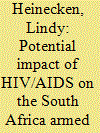

|
|
|
|
|
| Publication |
2009.
|
| Summary/Abstract |
HIV/AIDS has wide ramifications for the armed forces, especially in those regions where
the epidemic is most prevalent. Understanding how this disease affects armed forces and
more specifically the SANDF as regional military power is not only of national but also
of regional and international concern. In this article an attempt is made to uncover how
HIV/AIDS affects force procurement, namely the ability to recruit suitable candidates
for military service in South Africa. The discussion then moves to within the SANDF
and an effort is made to indentify possible problem areas in terms of personnel shortages
by looking at current rates of attrition in certain age and occupational categories. In
light of this, the impact on force employment and deployment is assessed. In the final
section the influence HIV/AIDS has on force sustainment is discussed, as well as the
health, financial and diplomatic and human rights implications this disease poses for
armed forces.
|
|
|
|
|
|
|
|
|
|
|
|
|
|
|
|
| 8 |
ID:
097671
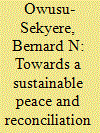

|
|
|
|
|
| Publication |
2009.
|
| Summary/Abstract |
The article begins with a profile of the Ivorian civil war which remains at management
stage pending the result of a successful democratic election to seal the various agreements
signed between the government and the rebel parties. Taking examples from West Africa,
a case is presented for constituting and pursuing a reconciliatory process that deals with
the hurts and harms arising from human right abuse and extra-judicial killings by both
the state army and rebel forces. Reconciliation processes in Latin America and sub-
Saharan Africa are examined and a truth and reconciliation commission is proposed for
Côte d'Ivoire.
|
|
|
|
|
|
|
|
|
|
|
|
|
|
|
|
|
|
|
|
|